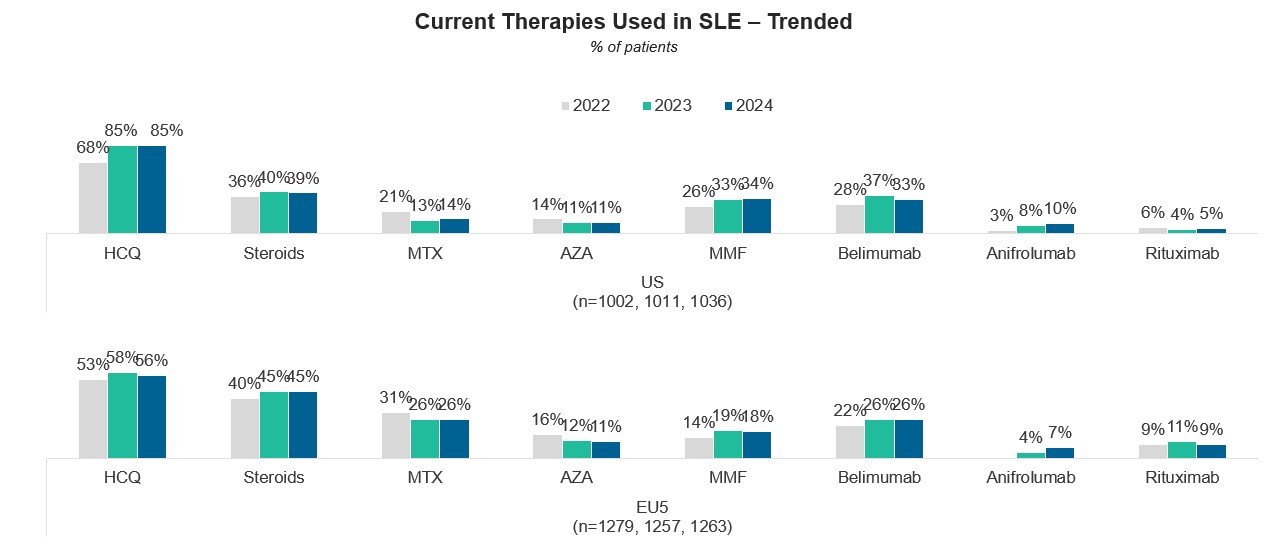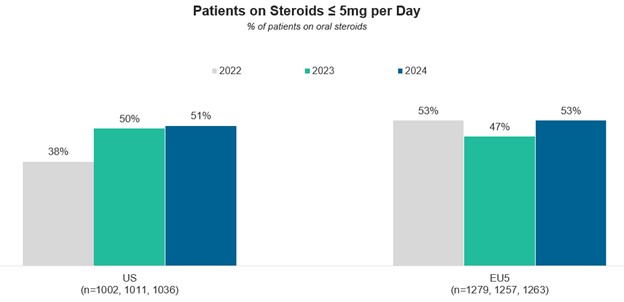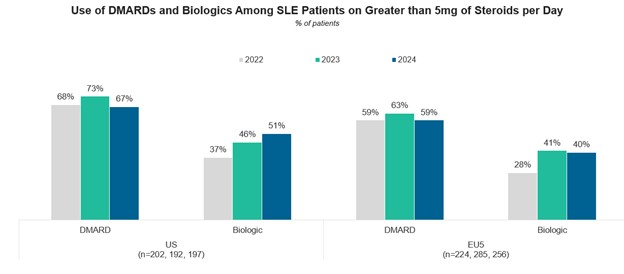Session Information
Date: Sunday, November 17, 2024
Title: SLE – Treatment Poster II
Session Type: Poster Session B
Session Time: 10:30AM-12:30PM
Background/Purpose: In October 2023, EULAR released updated recommendations for the management of SLE2. Notably, since the previous guidelines update in 2019, anifrolumab received approval for treatment of SLE, and belimumab and voclosporin for LN.
Methods: 1,263 moderate-to-severe (M/S) adult SLE patient records were collected in collaboration with 256 EU5 rheumatologists via an online survey platform from March through April 2024. Further, 1,036 M/S SLE patient records were collected in collaboration with 176 US rheumatologists via an online survey platform from March through April 2024.
Results: The first EULAR recommendation states that HCQ should be used in all SLE patients, unless contraindicated. Audited patient charts reveal that M/S SLE patients were increasingly initiated on HCQ therapy (compared with 2022) – often perceived and utilized as the foundational agent for SLE. However, there is a substantial discrepancy in HCQ prescription rates between patients in the US and those in the EU5, with a notably higher prevalence evident in the US.
Second, EULAR recommends that glucocorticoids (GCs) be lowered to a maintenance daily dose of ≤ 5mg and withdrawn when possible. Audited patient data shows the proportion of SLE patients receiving GCs increased since 2022, to 39% in the US patients and 45% in EU5. Notably, among those receiving oral steroids, only approximately half of audited patients in both US and EU5 are on maintenance doses of ≤ 5mg. That said, the proportion of patients in the US on the recommended lower dose increased by 13 percentage points between 2022 and 2023, without change in EU5.
Third, EULAR guidelines recommend rheumatologists should consider adding traditional DMARDs (methotrexate, azathioprine, or mycophenolate mofetil) and/or biologics to patients who fail to respond to HCQ or those who fail to taper to maintenance GC doses of ≤ 5mg. In both US and EU5, there has been a discernible decline in utilization of methotrexate and azathioprine, paralleled by a notable rise in the usage of biologics. The use of mycophenolate mofetil (MMF) increased in both geographies, as this agent is a staple of care in patients with SLE and LN.
In both geographies, there has been no change since 2022 in the use of concomitant DMARDs in audited patients receiving greater than 5mg GCs per day; however, there has been an increase in the use of biologics compared to 2022. Notably, the gap in biologic use between the US and EU in these patients has expanded, with an eleven percentage-point gap in 2024, compared to nine percentage-points in 2022.
Conclusion: While SLE management practices in the US and EU5 share similarities, there are notable differences, particularly in HCQ. Importantly, both regions show increasing adoption of biologics, especially for steroid-dependent patients. Future research is needed to understand the drivers of these geographical differences and how physicians globally may optimize their SLE management strategies to better adhere to the new EULAR recommendations.
To cite this abstract in AMA style:
Yarnall M, Rex R, May S. Not yet on Track: Retrospective Chart Analysis Reveals Physician’s Treatment Approaches in SLE Fall Short of New EULAR Guidance [abstract]. Arthritis Rheumatol. 2024; 76 (suppl 9). https://acrabstracts.org/abstract/not-yet-on-track-retrospective-chart-analysis-reveals-physicians-treatment-approaches-in-sle-fall-short-of-new-eular-guidance/. Accessed .« Back to ACR Convergence 2024
ACR Meeting Abstracts - https://acrabstracts.org/abstract/not-yet-on-track-retrospective-chart-analysis-reveals-physicians-treatment-approaches-in-sle-fall-short-of-new-eular-guidance/



